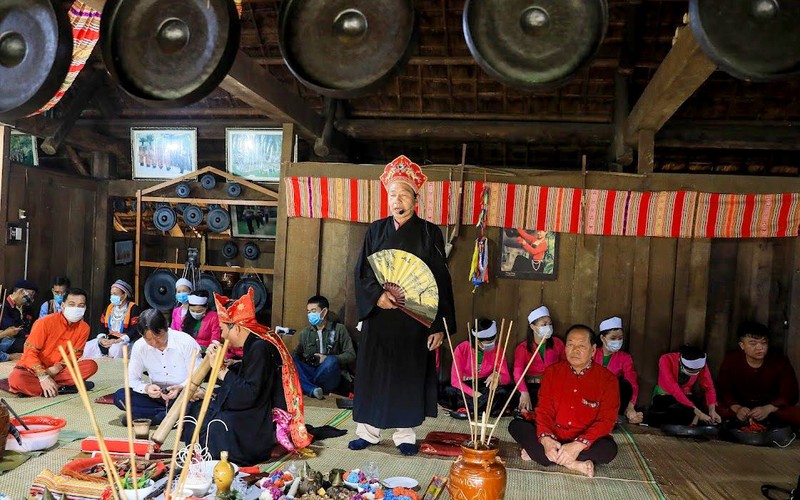
(HBO) – Mo Muong is a kind of heritage holding the special cultural essence of the Muong ethnic people. To seek the world heritage title for Mo Muong, it needs to be assessed in comparison with the Muong ethnic culture and similar heritage types in the world so as to highlight its unique values.
A Mo shaman practices a ritual in a house of
Muong people.
Mo Muong is a form of folk belief consisting of
three main factors: the environment for practices, Mo lyrics, and Mo artisans.
Recently, an international workshop on Mo Muong
and similar rituals of beliefs in the world has been held in Hoa Binh province
by the provincial Department of Culture, Sports and Tourism and the Musicology
Institute under the Vietnam National Academy of Music. It helped supplement
scientific information about Mo Muong and created a chance for the community
possessing this heritage to directly take part in the compilation of a dossier
seeking the UNESCO recognition of Mo Muong as part of world intangible cultural
heritage in need of urgent safeguarding.
Dr Do Quang Trong, Deputy Director of the Thanh
Hoa provincial Department of Culture, Sports and Tourism, and Dr Nguyen Van
Hai, Director of Thanh Hoa’s centre for history studies and cultural heritage
preservation, said Mo Muong is sacred folk rituals of the Muong ethnic minority
in funerals or ceremonies praying for good things.
It is associated with the human life cycle, they
said, elaborating that a Mo shaman prays for blessing for a newborn; expels
evil spirits from a sick person; performs rituals in weddings, ancestor worship
ceremonies, or new house celebrations; and serves as a bridge seeing off the
soul of the deceased to the afterlife.
About special values of Mo Muong, researcher and
Meritorious Artisan Bui Van Noi said the first outstanding value is its epic
characteristic with content related to the history of the Muong ethnic group
and humankind. The heritage also bears spiritual and custom values, teaches
people lessons about industriousness, along with values in terms of philosophy,
performing arts, and demonstration language.
Prof. and Dr Wolfgang Mastnak from Germany’s
University of Music and Performing Arts Munich held that Mo Muong matches many
UNESCO criteria for intangible cultural heritage such as its compatibility with
human rights and mutual respect for culture; being considered an indispensable
part of the cultural life by the community practicing it; and being deeply
rooted in the community and continuously passed down to future generations and
recreated.
Mo Muong reflects cultural diversity in the world
and also the creativity of humankind, he added.
However, amid the wave of modern cultures, Mo
Muong is facing the risk of disintegration, requiring all-round solutions to
preserve and bring it into play.
MA Vu Thanh Lich, Deputy Director of the Ninh Binh
provincial Department of Culture and Sports, and Dr Nguyen Thi Thanh Van from
the Hanoi University of Culture pointed out the need for concerted and strong
engagement from relevant parties, including local administrations, cultural
authorities, the community possessing the heritage, researchers, and relevant
organisations and individuals to uphold and promote the values of Mo Muong in
the Muong ethnic community./.
With an increasingly vibrant and widespread emulation movement aimed at building cultured residential areas and cultured families, Yen Thuy District has been making steady progress toward improving both the material and spiritual well-being of its people, while fostering a civilized, prosperous, beautiful, and progressive community.
Once lacking recreational spaces and community facilities, Residential Group 2 in Quynh Lam Ward (Hoa Binh City) has recently received attention for the construction of a new, spacious, and fully equipped cultural house. The project followed the model of state support combined with public contributions in both labor and funding.
The "All people unite to build cultural life" movement, which has been effectively integrated with Kim Boi district’s socio-economic development goals, is fostering a lively spirit of emulation across local residential areas, hamlets, villages, public agencies, and enterprises. In addition, through the initiative, traditional cultural values are being preserved and promoted, while community solidarity and mutual support in poverty reduction and economic development are being strengthened.
A working delegation of the Hoa Binh provincial People’s Committee led by its Permanent Vice Chairman Nguyen Van Toan on June 11 inspected the progress of a project to build the Mo Muong Cultural Heritage Conservation Space linked to tourism services in Hop Phong commune, Cao Phong district.
Born and growing in the heroic land of Muong Dong, Dinh Thi Kieu Dung, a resident in Bo town of Kim Boi district, in her childhood was nurtured by the sweet lullabies of her grandmother and mother. These melodies deeply imprinted on her soul, becoming an inseparable part of her love for her ethnic group's culture. For over 20 years, this love for her hometown has driven Dung to research, collect, and pass down the cultural values of the Muong people to future generations.
In the final days of May, the Ethnic Art Troupe of Hoa Binh Province organized performances to serve the people in remote, mountainous, and particularly disadvantaged areas within the province. These were not just ordinary artistic shows, but they were the meaningful journeys aimed at spreading cultural values, enhancing the spiritual life of the people and contributing to the preservation of ethnic minority cultural identities.



